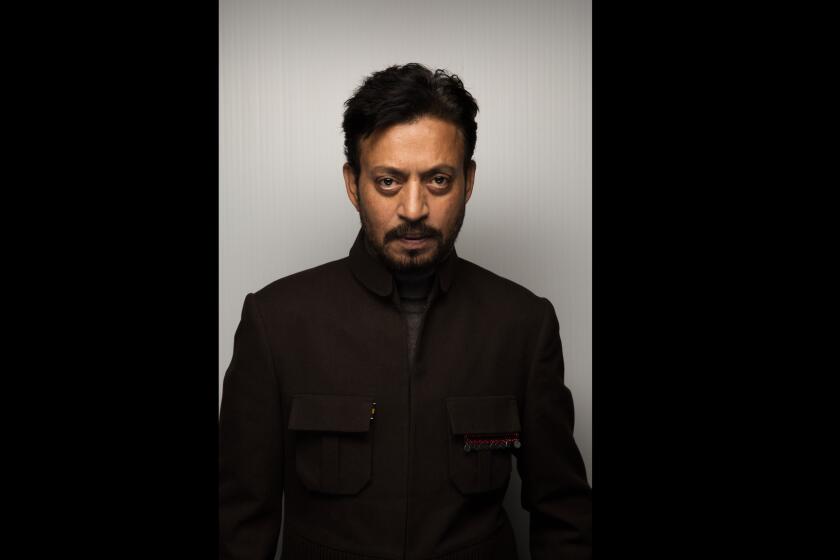Appreciation: Irrfan Khan, movie star of unmatched grace, exuded emotion in the smallest of acts
- Share via
As the quiet, grieving widower of the crossover Indian film “The Lunchbox,” actor Irrfan Khan portrayed grief, sadness and longing with such subtle elegance that the mere act of pouring tea from a thermos felt revelatory.
The Indian actor, who died Wednesday in Mumbai at the age of 53 after a battle with cancer, was a master at conveying complex feelings in the smallest of acts, a talent that earned him the rare distinction of conquering both Hindi cinema and Hollywood with his integrity intact.
English-speaking audiences know Khan best as the philosophical, adult version of Pi in Ang Li’s “Life of Pi,” the probing police inspector in Danny Boyle’s “Slumdog Millionaire,” and the immigrant father determined to assimilate in Mira Nair’s “The Namesake.”
His career spanned nearly 80 films, from roles in American art-house releases such as “Puzzle” to blockbusters like “Jurassic World” and “The Amazing Spider-Man.” In India he was renowned for his performances in multiple hit films including “Maqbool,” “Piku” and “Hindi Medium.”
Irrfan Khan, a Bollywood star and one of India’s most well-known exports to Hollywood, dies after a battle with colon cancer.
No matter the country, culture or language, Khan infused his characters with a hidden depth that felt so real it left scars. In 2007’s “The Namesake,” based on the novel by Jhumpa Lahiri, his portrayal of a Kolkata native who moves to New York produced a beautiful performance of empathic brilliance. He captured the internal conflict of burying one’s heritage while embracing the new world with such understanding that immigrants to America and their children saw their lives playing out on the screen in painful, stunning detail.
In the 2008 Oscar-winning hit “Slumdog,” Khan’s detective wasn’t just a corrupt thug, he was also damaged goods — just like his detainee, Dev Patel’s character Jamal. The officer was jaded, and discovered in Jamal an authenticity and honesty that he perhaps lost long ago. He changed course and instead of jailing Jamal, he freed the poor “slumdog.” It was an unspoken change of heart, exuded rather than verbalized.
And just to show he could do more than rip your heart out, Khan also was the voice of Baloo in “Jungle Book” — the Hindi-dubbed version.
As the film world and fans mourned his passing Wednesday, sentiments came from all over the globe and all strata of celebrity. Bollywood legend Amitabh Bachchan tweeted: “An incredible talent .. a gracious colleague .. a prolific contributor to the World of Cinema .. left us too soon .. creating a huge vacuum .. Prayers and duas.”
Kal Penn, who costarred with Khan in “The Namesake,” also posted his condolences on Twitter: “Irrfan’s art and humanity will be badly missed. Never seen someone use the beats of silence so beautifully to convey so much about who we are. Sending love to Sutapa and the family.”
His recent gems include his role as romantic lead of the 2018 American indie film “Puzzle,” where he played a reclusive inventor and former puzzle tournament champion.
Hollywood and Bollywood stars honor Indian actor Irrfan Khan (‘Slumdog Millionaire,’ ‘Life of Pi’), who died Wednesday at 53.
Born Sahabzada Irfan Ali Khan to a wealthy Muslim family in the Indian state of Rajasthan, he spent the first decade of his career in the world of Indian soap operas. Though he was set to appear in Nair’s critically lauded 1988 “Salaam Bombay!,” his breakthrough would take 12 more years, with the British-Indian film “The Warrior.” He landed the lead role of a rebel fighter in feudal India, a portrait of ferocity that ironically launched the understated actor’s career.
In 2018, in a tweet announcing his diagnosis with neuroendocrine tumors, Khan quoted “Gone With the Wind” author Margaret Mitchell — “Life is under no obligation to give us what we expect” — and added, “The unexpected makes us grow... I hope to be back with more stories to tell.”
The cinema is where we often go to see our best and worst selves, and to gain access to buried parts of our lives that are too painful to touch outside the safety of a theater or film. Khan was a conduit to that pain and love, that loss and redemption; a master in the art of emotive silence, as Penn pointed out, he performed that special trick of only the most luminous stars: To impart grace in the least graceful of places. All the way to the end.
More to Read
Only good movies
Get the Indie Focus newsletter, Mark Olsen's weekly guide to the world of cinema.
You may occasionally receive promotional content from the Los Angeles Times.











